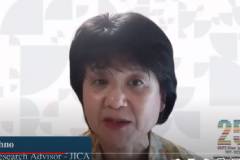Joint Seminar with ACET Discusses Policy Priorities to Transform Africa’s Economies Post COVID-19
2022.08.30
On June 22, 2022, the African Center for Economic Transformation (ACET) together with JICA Ogata Sadako Research Institute for Peace and Development (JICA Ogata Research Institute) hosted a webinar “Africa after COVID-19: Resetting Policy Priorities to Transform Economies.” What should be the policy responses to strengthen recovery and enable sustainable development and economic integration beyond the COVID-19 pandemic in Africa to build resilient society? Based on the findings from ACET/JICA policy-oriented research on African economic transformation, the webinar explored this question and set the scene for selected topics to be discussed at the Tokyo International Conference for African Development (TICAD 8), which was held in August 2022 in Tunisia.
In his opening remarks, Kingsley Yeboah Amoako, president and founder of ACET, explained that with most African countries struggling to recover from the pandemic, it is important to learn key lessons from economic transformation across Africa and beyond because resilience is rooted in transformation.
Masuda Junko, director general of Africa Department at JICA, then outlined the research project, which was launched in 2020 to formulate a vision on how to help Africa to overcome the COVID-19 crisis and acknowledged that economic transformation and human security are key concepts for Africa's development in the post COVID-19 era.
Next, Roberto J. Tibana, director of research at ACET, explained the growth-transformation-resilience relationship based on country classifications on DEPTH dimensions (diversification in production and export, export competitiveness, productivity increases, technology upgrading, and improved human well-being). According to Tibana, resilience depends on the economy's ability to focus on transformation and emphasized the need to have a coherent industrial policy, to develop well supported, managed and financed Industrial Policy Organizations, to establish effective coordination mechanisms with the private sector to address major market failures, and to fix the political economy of development.
Ohno Izumi, senior research advisor of JICA Ogata Research Institute, took part in a panel discussion that followed. When asked about the impact of the COVID-19 pandemic on African economies, she observed that the COVID-19 pandemic was not only a health crisis, but also a social and economic crisis on a global scale. And the effects have varied from industry to industry, though the services industry was affected the most. Further, she noted that Africa has managed the crisis better than North American or European countries, but that the recovery has been slow due to preexisting structural problems that are often country-specific and a lack of vaccines on the continent. She identified the following critical factors for developing effective industrial policies: public-private sector partnerships, strong leadership commitment, development of core agencies in charge of industrial sectors, and diversity of development strategies. She also mentioned that Africa can explore opportunities in green industrialization, add value to raw products to enable the command of fair pricing, develop their own domestic industries and take advantage of regional partnerships such as the African Continental Free Trade Area (AfCFTA) to attract our fair share of the global value chain. As a matter of importance to youth employment, she touched on the ongoing JICA support to start-up business for African young entrepreneurs.

Kingsley Yeboah Amoako, president and founder of ACET

Masuda Junko, director general of Africa Department at JICA

Roberto J. Tibana, director of research at ACET

Ohno Izumi, senior research advisor of JICA Ogata Research Institute
Margaret McMillan, professor of economics at Tufts University, stated that the main impacts of the pandemic were the drying up of resources from the international community as well as the consequences of the closing of small and medium-sized enterprises (SMEs) which are the backbone of a lot of African economies. She stressed that the slow recovery of many African countries was largely due to the informal nature of the African economies, impact of the lockdown and social distancing on work of African entrepreneurs and the poor/ill informed decisions by leaders. Regarding the good practice in building economic resilience that can be learned from structural transformation or lack thereof in Africa and other parts of the world, McMillan compared Africa to Asia and said that “small and medium-sized enterprises should be taken seriously” by referring to their rapid employment growth taking place in the manufacturing sectors in Ethiopia and Tanzania. And that country specific strategies should be used to address the challenges faced by the various sectors.

Margaret McMillan, professor of economics at Tufts University
Ken Shawa, lead economist at the International Labour Organization, agreed that the crisis brought a lot of uncertainty and business closures, but explained that it also gave some countries the opportunity to implement new policies to support vulnerable people and businesses. He made known the COVID-19 pandemic encouraged dialogue between governments and communities, employers and employees, governments lending to SMEs and tax breaks. Shawa continued to emphasize the necessity for Africa to have policy programs that “carry the youth with them," particularly by providing them better education, better skills and social protection. All these initiatives should be complemented with social and economic dialogues to eliminate gender-based violence, ensure equal pay and representation of women in the decision-making positions roles. Lastly, he also emphasized the need to promote employment for youth and women, as well as the transition from informal to formal employment to make social protection accessible to all.

Ken Shawa, lead economist at the International Labour Organization
Dimpho Lekgeu, who served as the moderator, then asked the panelists to assert the three policy priorities that they believe are critical to drive transformation and build resilience for African economies. MacMillan said, “African governments need to think about how they can rely less on foreign assistance and do more for themselves,” and encouraged them to build up their healthcare industry and intra-African trade as a higher priority. Ohno emphasized that African governments should engage more with the private sector, invest more in human skills including digitalization and focus on firm capability building, including SME development. Shawa suggested social protection for all, employment promotion with particular emphasis on youth and women as well as a transition from informal economy to formal economy.
In the Q&A session, a questioner asked who should be driving the promotion of manufacturing, while another member of the audience commented that Africa is suffering a brain drain where the highly educated and working youth look elsewhere for better lives rather than focus on building Africa.
Webinar | Africa after COVID-19: Resetting Policy Priorities to Transform Economies (ACET YouTube)

事業事前評価表(地球規模課題対応国際科学技術協力(SATREPS)).国際協力機構 地球環境部 . 防災第一チーム. 1.案件名.国 名: フィリピン共和国.

事業事前評価表(地球規模課題対応国際科学技術協力(SATREPS)).国際協力機構 地球環境部 . 防災第一チーム. 1.案件名.国 名: フィリピン共和国.

事業事前評価表(地球規模課題対応国際科学技術協力(SATREPS)).国際協力機構 地球環境部 . 防災第一チーム. 1.案件名.国 名: フィリピン共和国.

事業事前評価表(地球規模課題対応国際科学技術協力(SATREPS)).国際協力機構 地球環境部 . 防災第一チーム. 1.案件名.国 名: フィリピン共和国.

事業事前評価表(地球規模課題対応国際科学技術協力(SATREPS)).国際協力機構 地球環境部 . 防災第一チーム. 1.案件名.国 名: フィリピン共和国.
scroll